- Home
- L. M. Montgomery
Anne of Avonlea Page 26
Anne of Avonlea Read online
Page 26
XXVI
Around the Bend
Thomas Lynde faded out of life as quietly and unobtrusively as he hadlived it. His wife was a tender, patient, unwearied nurse. SometimesRachel had been a little hard on her Thomas in health, when his slownessor meekness had provoked her; but when he became ill no voice could belower, no hand more gently skillful, no vigil more uncomplaining.
"You've been a good wife to me, Rachel," he once said simply, when shewas sitting by him in the dusk, holding his thin, blanched old handin her work-hardened one. "A good wife. I'm sorry I ain't leaving youbetter off; but the children will look after you. They're all smart,capable children, just like their mother. A good mother . . . a goodwoman . . . ."
He had fallen asleep then, and the next morning, just as the white dawnwas creeping up over the pointed firs in the hollow, Marilla went softlyinto the east gable and wakened Anne.
"Anne, Thomas Lynde is gone . . . their hired boy just brought the word.I'm going right down to Rachel."
On the day after Thomas Lynde's funeral Marilla went about Green Gableswith a strangely preoccupied air. Occasionally she looked at Anne,seemed on the point of saying something, then shook her head andbuttoned up her mouth. After tea she went down to see Mrs. Rachel; andwhen she returned she went to the east gable, where Anne was correctingschool exercises.
"How is Mrs. Lynde tonight?" asked the latter.
"She's feeling calmer and more composed," answered Marilla, sittingdown on Anne's bed . . . a proceeding which betokened some unusual mentalexcitement, for in Marilla's code of household ethics to sit on abed after it was made up was an unpardonable offense. "But she's verylonely. Eliza had to go home today . . . her son isn't well and she feltshe couldn't stay any longer."
"When I've finished these exercises I'll run down and chat awhile withMrs. Lynde," said Anne. "I had intended to study some Latin compositiontonight but it can wait."
"I suppose Gilbert Blythe is going to college in the fall," said Marillajerkily. "How would you like to go too, Anne?"
Anne looked up in astonishment.
"I would like it, of course, Marilla. But it isn't possible."
"I guess it can be made possible. I've always felt that you should go.I've never felt easy to think you were giving it all up on my account."
"But Marilla, I've never been sorry for a moment that I stayedhome. I've been so happy . . . Oh, these past two years have just beendelightful."
"Oh, yes, I know you've been contented enough. But that isn't thequestion exactly. You ought to go on with your education. You've savedenough to put you through one year at Redmond and the money the stockbrought in will do for another year . . . and there's scholarships andthings you might win."
"Yes, but I can't go, Marilla. Your eyes are better, of course; but Ican't leave you alone with the twins. They need so much looking after."
"I won't be alone with them. That's what I meant to discuss with you.I had a long talk with Rachel tonight. Anne, she's feeling dreadful badover a good many things. She's not left very well off. It seems theymortgaged the farm eight years ago to give the youngest boy a startwhen he went west; and they've never been able to pay much more than theinterest since. And then of course Thomas' illness has cost a good deal,one way or another. The farm will have to be sold and Rachel thinksthere'll be hardly anything left after the bills are settled. She saysshe'll have to go and live with Eliza and it's breaking her heart tothink of leaving Avonlea. A woman of her age doesn't make new friendsand interests easy. And, Anne, as she talked about it the thought cameto me that I would ask her to come and live with me, but I thought Iought to talk it over with you first before I said anything to her. If Ihad Rachel living with me you could go to college. How do you feel aboutit?"
"I feel . . . as if . . . somebody . . . had handed me . . . the moon. . . and I didn't know . . . exactly . . . what to do . . . with it,"said Anne dazedly. "But as for asking Mrs. Lynde to come here, that isfor you to decide, Marilla. Do you think . . . are you sure . . . youwould like it? Mrs. Lynde is a good woman and a kind neighbor, but . . .but . . ."
"But she's got her faults, you mean to say? Well, she has, of course;but I think I'd rather put up with far worse faults than see Rachel goaway from Avonlea. I'd miss her terrible. She's the only close friendI've got here and I'd be lost without her. We've been neighbors forforty-five years and we've never had a quarrel . . . though we came rathernear it that time you flew at Mrs. Rachel for calling you homely andredhaired. Do you remember, Anne?"
"I should think I do," said Anne ruefully. "People don't forget thingslike that. How I hated poor Mrs. Rachel at that moment!"
"And then that 'apology' you made her. Well, you were a handful, in allconscience, Anne. I did feel so puzzled and bewildered how to manageyou. Matthew understood you better."
"Matthew understood everything," said Anne softly, as she always spokeof him.
"Well, I think it could be managed so that Rachel and I wouldn't clashat all. It always seemed to me that the reason two women can't get alongin one house is that they try to share the same kitchen and get in eachother's way. Now, if Rachel came here, she could have the north gablefor her bedroom and the spare room for a kitchen as well as not, for wedon't really need a spare room at all. She could put her stove thereand what furniture she wanted to keep, and be real comfortable andindependent. She'll have enough to live on of course...her children'llsee to that...so all I'd be giving her would be house room. Yes, Anne,far as I'm concerned I'd like it."
"Then ask her," said Anne promptly. "I'd be very sorry myself to seeMrs. Rachel go away."
"And if she comes," continued Marilla, "You can go to college as well asnot. She'll be company for me and she'll do for the twins what I can'tdo, so there's no reason in the world why you shouldn't go."
Anne had a long meditation at her window that night. Joy and regretstruggled together in her heart. She had come at last . . . suddenly andunexpectedly . . . to the bend in the road; and college was around it,with a hundred rainbow hopes and visions; but Anne realized as well thatwhen she rounded that curve she must leave many sweet things behind. . .all the little simple duties and interests which had grown so dear toher in the last two years and which she had glorified into beauty anddelight by the enthusiasm she had put into them. She must give up herschool . . . and she loved every one of her pupils, even the stupid andnaughty ones. The mere thought of Paul Irving made her wonder if Redmondwere such a name to conjure with after all.
"I've put out a lot of little roots these two years," Anne told themoon, "and when I'm pulled up they're going to hurt a great deal. Butit's best to go, I think, and, as Marilla says, there's no good reasonwhy I shouldn't. I must get out all my ambitions and dust them."
Anne sent in her resignation the next day; and Mrs. Rachel, after aheart to heart talk with Marilla, gratefully accepted the offer of ahome at Green Gables. She elected to remain in her own house for thesummer, however; the farm was not to be sold until the fall and therewere many arrangements to be made.
"I certainly never thought of living as far off the road as GreenGables," sighed Mrs. Rachel to herself. "But really, Green Gablesdoesn't seem as out of the world as it used to do . . . Anne has lots ofcompany and the twins make it real lively. And anyhow, I'd rather liveat the bottom of a well than leave Avonlea."
These two decisions being noised abroad speedily ousted the arrival ofMrs. Harrison in popular gossip. Sage heads were shaken over MarillaCuthbert's rash step in asking Mrs. Rachel to live with her. Peopleopined that they wouldn't get on together. They were both "too fond oftheir own way," and many doleful predictions were made, none of whichdisturbed the parties in question at all. They had come to a clear anddistinct understanding of the respective duties and rights of their newarrangements and meant to abide by them.
"I won't meddle with you nor you with me," Mrs. Rachel had saiddecidedly, "and as for the twins, I'll be glad to do all I can for them;but I won't undertake to answer Davy's questions, that's wh
at. I'm notan encyclopedia, neither am I a Philadelphia lawyer. You'll miss Annefor that."
"Sometimes Anne's answers were about as queer as Davy's questions," saidMarilla drily. "The twins will miss her and no mistake; but her futurecan't be sacrificed to Davy's thirst for information. When he asksquestions I can't answer I'll just tell him children should be seen andnot heard. That was how I was brought up, and I don't know but what itwas just as good a way as all these new-fangled notions for trainingchildren."
"Well, Anne's methods seem to have worked fairly well with Davy," saidMrs. Lynde smilingly. "He is a reformed character, that's what."
"He isn't a bad little soul," conceded Marilla. "I never expected toget as fond of those children as I have. Davy gets round you somehow. . . and Dora is a lovely child, although she is . . . kind of . . .well, kind of . . ."
"Monotonous? Exactly," supplied Mrs. Rachel. "Like a book where everypage is the same, that's what. Dora will make a good, reliable womanbut she'll never set the pond on fire. Well, that sort of folks arecomfortable to have round, even if they're not as interesting as theother kind."
Gilbert Blythe was probably the only person to whom the news of Anne'sresignation brought unmixed pleasure. Her pupils looked upon it asa sheer catastrophe. Annetta Bell had hysterics when she went home.Anthony Pye fought two pitched and unprovoked battles with other boys byway of relieving his feelings. Barbara Shaw cried all night. Paul Irvingdefiantly told his grandmother that she needn't expect him to eat anyporridge for a week.
"I can't do it, Grandma," he said. "I don't really know if I can eatANYTHING. I feel as if there was a dreadful lump in my throat. I'd havecried coming home from school if Jake Donnell hadn't been watching me.I believe I will cry after I go to bed. It wouldn't show on my eyestomorrow, would it? And it would be such a relief. But anyway, I can'teat porridge. I'm going to need all my strength of mind to bear upagainst this, Grandma, and I won't have any left to grapple withporridge. Oh Grandma, I don't know what I'll do when my beautifulteacher goes away. Milty Boulter says he bets Jane Andrews will getthe school. I suppose Miss Andrews is very nice. But I know she won'tunderstand things like Miss Shirley."
Diana also took a very pessimistic view of affairs.
"It will be horribly lonesome here next winter," she mourned, onetwilight when the moonlight was raining "airy silver" through the cherryboughs and filling the east gable with a soft, dream-like radiancein which the two girls sat and talked, Anne on her low rocker by thewindow, Diana sitting Turkfashion on the bed. "You and Gilbert willbe gone . . . and the Allans too. They are going to call Mr. Allan toCharlottetown and of course he'll accept. It's too mean. We'll bevacant all winter, I suppose, and have to listen to a long string ofcandidates . . . and half of them won't be any good."
"I hope they won't call Mr. Baxter from East Grafton here, anyhow,"said Anne decidedly. "He wants the call but he does preach such gloomysermons. Mr. Bell says he's a minister of the old school, but Mrs. Lyndesays there's nothing whatever the matter with him but indigestion. Hiswife isn't a very good cook, it seems, and Mrs. Lynde says that when aman has to eat sour bread two weeks out of three his theology is boundto get a kink in it somewhere. Mrs. Allan feels very badly about goingaway. She says everybody has been so kind to her since she came hereas a bride that she feels as if she were leaving lifelong friends. Andthen, there's the baby's grave, you know. She says she doesn't see howshe can go away and leave that . . . it was such a little mite of a thingand only three months old, and she says she is afraid it will miss itsmother, although she knows better and wouldn't say so to Mr. Allan foranything. She says she has slipped through the birch grove back of themanse nearly every night to the graveyard and sung a little lullaby toit. She told me all about it last evening when I was up putting some ofthose early wild roses on Matthew's grave. I promised her that as longas I was in Avonlea I would put flowers on the baby's grave and when Iwas away I felt sure that . . ."
"That I would do it," supplied Diana heartily. "Of course I will. AndI'll put them on Matthew's grave too, for your sake, Anne."
"Oh, thank you. I meant to ask you to if you would. And on little HesterGray's too? Please don't forget hers. Do you know, I've thought anddreamed so much about little Hester Gray that she has become strangelyreal to me. I think of her, back there in her little garden in thatcool, still, green corner; and I have a fancy that if I could steal backthere some spring evening, just at the magic time 'twixt light anddark, and tiptoe so softly up the beech hill that my footsteps could notfrighten her, I would find the garden just as it used to be, all sweetwith June lilies and early roses, with the tiny house beyond it all hungwith vines; and little Hester Gray would be there, with her soft eyes,and the wind ruffling her dark hair, wandering about, putting herfingertips under the chins of the lilies and whispering secrets with theroses; and I would go forward, oh, so softly, and hold out my hands andsay to her, 'Little Hester Gray, won't you let me be your playmate, forI love the roses too?' And we would sit down on the old bench and talka little and dream a little, or just be beautifully silent together. Andthen the moon would rise and I would look around me . . . and there wouldbe no Hester Gray and no little vine-hung house, and no roses . . . onlyan old waste garden starred with June lilies amid the grasses, and thewind sighing, oh, so sorrowfully in the cherry trees. And I would notknow whether it had been real or if I had just imagined it all." Dianacrawled up and got her back against the headboard of the bed. When yourcompanion of twilight hour said such spooky things it was just as wellnot to be able to fancy there was anything behind you.
"I'm afraid the Improvement Society will go down when you and Gilbertare both gone," she remarked dolefully.
"Not a bit of fear of it," said Anne briskly, coming back from dreamlandto the affairs of practical life. "It is too firmly established forthat, especially since the older people are becoming so enthusiasticabout it. Look what they are doing this summer for their lawns andlanes. Besides, I'll be watching for hints at Redmond and I'll write apaper for it next winter and send it over. Don't take such a gloomy viewof things, Diana. And don't grudge me my little hour of gladness andjubilation now. Later on, when I have to go away, I'll feel anything butglad."
"It's all right for you to be glad . . . you're going to college andyou'll have a jolly time and make heaps of lovely new friends."
"I hope I shall make new friends," said Anne thoughtfully. "Thepossibilities of making new friends help to make life very fascinating.But no matter how many friends I make they'll never be as dear to me asthe old ones . . . especially a certain girl with black eyes and dimples.Can you guess who she is, Diana?"
"But there'll be so many clever girls at Redmond," sighed Diana, "andI'm only a stupid little country girl who says 'I seen' sometimes. . .though I really know better when I stop to think. Well, of course thesepast two years have really been too pleasant to last. I know SOMEBODYwho is glad you are going to Redmond anyhow. Anne, I'm going to askyou a question . . . a serious question. Don't be vexed and do answerseriously. Do you care anything for Gilbert?"
"Ever so much as a friend and not a bit in the way you mean," said Annecalmly and decidedly; she also thought she was speaking sincerely.
Diana sighed. She wished, somehow, that Anne had answered differently.
"Don't you mean EVER to be married, Anne?"
"Perhaps . . . some day . . . when I meet the right one," said Anne,smiling dreamily up at the moonlight.
"But how can you be sure when you do meet the right one?" persistedDiana.
"Oh, I should know him . . . SOMETHING would tell me. You know what myideal is, Diana."
"But people's ideals change sometimes."
"Mine won't. And I COULDN'T care for any man who didn't fulfill it."
"What if you never meet him?"
"Then I shall die an old maid," was the cheerful response. "I daresay itisn't the hardest death by any means."
"Oh, I suppose the dying would be easy enough; it's the living an oldmaid I shouldn'
t like," said Diana, with no intention of being humorous."Although I wouldn't mind being an old maid VERY much if I could be onelike Miss Lavendar. But I never could be. When I'm forty-five I'll behorribly fat. And while there might be some romance about a thin oldmaid there couldn't possibly be any about a fat one. Oh, mind you,Nelson Atkins proposed to Ruby Gillis three weeks ago. Ruby told me allabout it. She says she never had any intention of taking him, becauseany one who married him will have to go in with the old folks; but Rubysays that he made such a perfectly beautiful and romantic proposal thatit simply swept her off her feet. But she didn't want to do anythingrash so she asked for a week to consider; and two days later she wasat a meeting of the Sewing Circle at his mother's and there was a bookcalled 'The Complete Guide to Etiquette,' lying on the parlor table.Ruby said she simply couldn't describe her feelings when in a sectionof it headed, 'The Deportment of Courtship and Marriage,' she found thevery proposal Nelson had made, word for word. She went home and wrotehim a perfectly scathing refusal; and she says his father and motherhave taken turns watching him ever since for fear he'll drown himself inthe river; but Ruby says they needn't be afraid; for in the Deportmentof Courtship and Marriage it told how a rejected lover should behaveand there's nothing about drowning in THAT. And she says Wilbur Blairis literally pining away for her but she's perfectly helpless in thematter."
Anne made an impatient movement.
"I hate to say it . . . it seems so disloyal . . . but, well, I don'tlike Ruby Gillis now. I liked her when we went to school and Queen'stogether . . . though not so well as you and Jane of course. But this lastyear at Carmody she seems so different . . . so . . . so . . ."
"I know," nodded Diana. "It's the Gillis coming out in her . . . shecan't help it. Mrs. Lynde says that if ever a Gillis girl thought aboutanything but the boys she never showed it in her walk and conversation.She talks about nothing but boys and what compliments they pay her, andhow crazy they all are about her at Carmody. And the strange thing is,they ARE, too . . ." Diana admitted this somewhat resentfully. "Lastnight when I saw her in Mr. Blair's store she whispered to me that she'djust made a new 'mash.' I wouldn't ask her who it was, because Iknew she was dying to BE asked. Well, it's what Ruby always wanted, Isuppose. You remember even when she was little she always said she meantto have dozens of beaus when she grew up and have the very gayest timeshe could before she settled down. She's so different from Jane, isn'tshe? Jane is such a nice, sensible, lady-like girl."
"Dear old Jane is a jewel," agreed Anne, "but," she added, leaningforward to bestow a tender pat on the plump, dimpled little hand hangingover her pillow, "there's nobody like my own Diana after all. Doyou remember that evening we first met, Diana, and 'swore' eternalfriendship in your garden? We've kept that 'oath,' I think . . . we'venever had a quarrel nor even a coolness. I shall never forget the thrillthat went over me the day you told me you loved me. I had had such alonely, starved heart all through my childhood. I'm just beginning torealize how starved and lonely it really was. Nobody cared anything forme or wanted to be bothered with me. I should have been miserable ifit hadn't been for that strange little dream-life of mine, wherein Iimagined all the friends and love I craved. But when I came to GreenGables everything was changed. And then I met you. You don't know whatyour friendship meant to me. I want to thank you here and now, dear, forthe warm and true affection you've always given me."
"And always, always will," sobbed Diana. "I shall NEVER love anybody. . . any GIRL . . . half as well as I love you. And if I ever do marryand have a little girl of my own I'm going to name her ANNE."

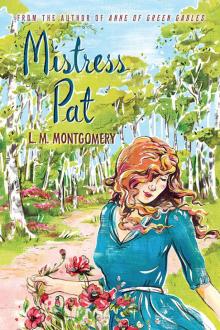 Mistress Pat
Mistress Pat A Tangled Web
A Tangled Web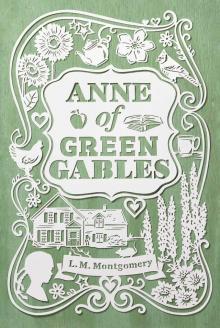 Anne of Green Gables
Anne of Green Gables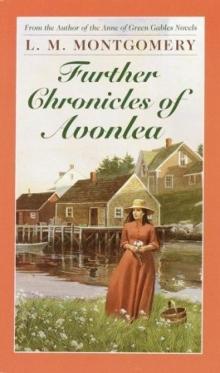 Further Chronicles of Avonlea
Further Chronicles of Avonlea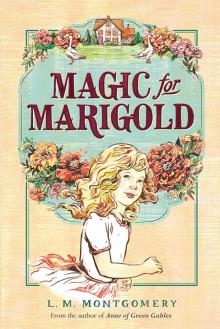 Magic for Marigold
Magic for Marigold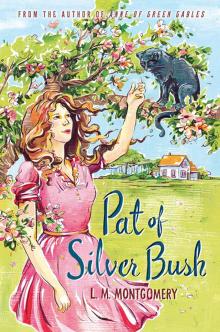 Pat of Silver Bush
Pat of Silver Bush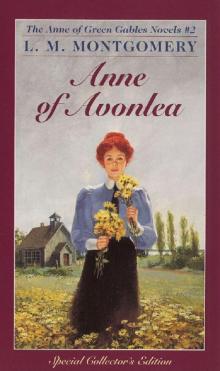 Anne of Avonlea
Anne of Avonlea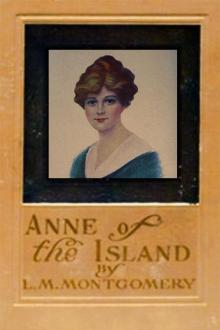 Anne of the Island
Anne of the Island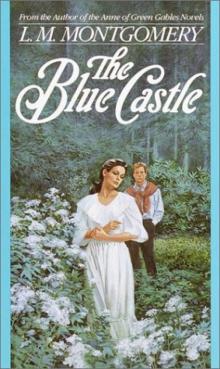 The Blue Castle
The Blue Castle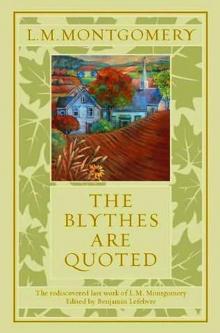 The Blythes Are Quoted
The Blythes Are Quoted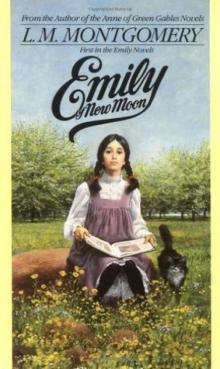 Emily of New Moon
Emily of New Moon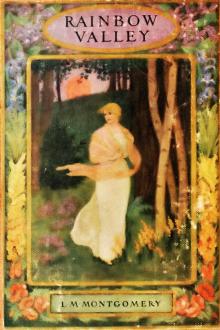 Rainbow Valley
Rainbow Valley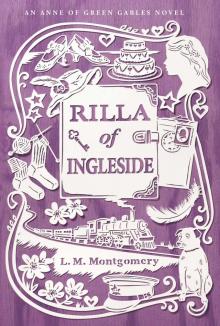 Rilla of Ingleside
Rilla of Ingleside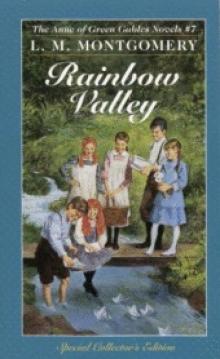 07 - Rainbow Valley
07 - Rainbow Valley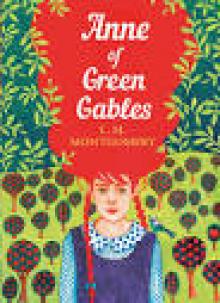 Anne of Green Gables (Penguin)
Anne of Green Gables (Penguin)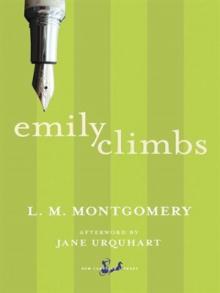 Emily Climbs
Emily Climbs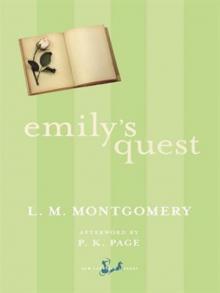 Emily's Quest
Emily's Quest A Name for Herself
A Name for Herself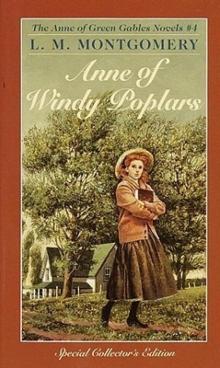 Anne of Windy Poplars
Anne of Windy Poplars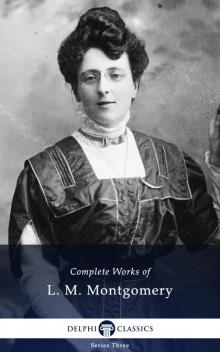 The Complete Works of L M Montgomery
The Complete Works of L M Montgomery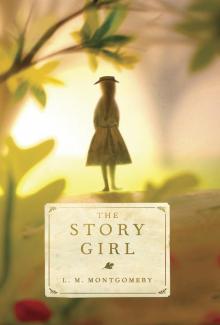 The Story Girl
The Story Girl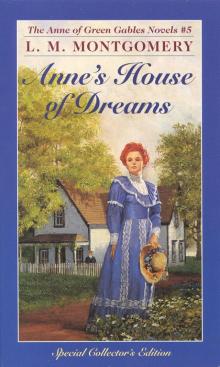 Anne's House of Dreams
Anne's House of Dreams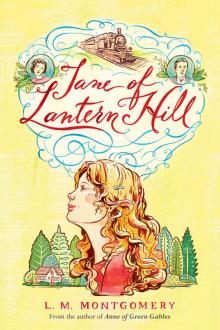 Jane of Lantern Hill
Jane of Lantern Hill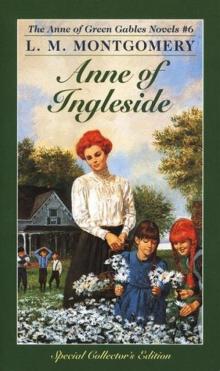 Anne of Ingleside
Anne of Ingleside